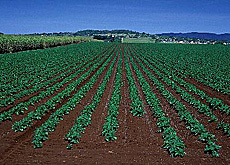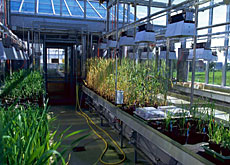Organic farmers sound alarm over GM crops

Environmentalists and farmers fear the commercial use of genetically modified organisms (GMOs) could destroy the livelihoods of Switzerland's 6,000 organic farmers.
They are lobbying hard for a moratorium on the use of GM crops, which is being debated in parliament this week.
The campaign, backed by a coalition of groups – including Greenpeace, Pro Natura and Switzerland’s powerful farmers’ association – comes ahead of a parliamentary vote on whether Switzerland should impose a five-year moratorium on GMOs, along with tough liability rules and restrictions on GM crop trials.
Farmers, in particular, fear that GMO technology is a one-way street – once Swiss agriculture opens to the door to genetically engineered plants, there can be no turning back.
According to the Federal Office for Agriculture, ten per cent of Swiss farms are organic. Their produce accounts for more than two per cent of all food sales in Switzerland and is worth up to SFr1 billion ($670 million) a year.
Much of the debate centres on concerns about the possible side effects of GMOs, which are designed to withstand pests, require less use of herbicides and produce faster-growing and more frequent crops.
Call for prudence
And while there is no clear consensus on the long-term impact of GMOs, many voices are urging caution.
Urs Schneider of the Swiss Farmers’ Association says Switzerland’s “GMO-free” status helps farmers market their products as genuine “organic produce”, untainted by the new technology.
“Swiss products have their worth and we want to maintain that in the future,” Schneider told swissinfo.
“[But] for our products to maintain their value over foreign products, we need a quality-control strategy… and this strategy requires agriculture that is free of genetically-modified crops,” he says.
GM-free worth the expense
Swiss farmers already face difficulty marketing their produce worldwide because of the country’s higher production costs. Swiss milk remains the world’s most expensive.
To counter this, Schneider says Swiss farmers have to focus on niche markets where consumers are prepared to pay more, such as GM-free organic produce.
“We have to distinguish ourselves from foreign products because we want to sell in a high-value price category,” says Schneider.
But in order for the strategy to have credibility, environmentalists say Swiss agriculture must remain organically pure – something that pro-GMO campaigners believe is a scientific nonsense (see related story “Genetically modified crop ban in Switzerland “a myth”).
Too many uncertainties
Greenpeace’s Bruno Heinzer says that once GMOs are introduced, they quickly cross-breed with unmodified varieties, leading to changes in ecological systems – sometimes with unforeseen consequences.
Heinzer describes North America’s experience with the commercial growing of GMOs as a “nightmare”.
“After five or six years of commercial growing… it’s no longer possible to buy (non-engineered) seeds and there are multi-resistant weeds that must be treated with more and more herbicides,” Heinzer told swissinfo.
“We don’t want this scenario in Switzerland,” he says.
Room for both?
Much of the debate centres on the question of whether GM crops can coexist alongside unmodified plants.
Proponents of GM crops argue that parliament should introduce laws to ensure GMOs are kept apart from non-modified varieties, something that has been done abroad.
However, research commissioned by the Austrian government suggests contamination by GMOs occurs over much larger distances than first thought.
The wind, along with insects, birds and other parts of the ecological cycle, has led to cross-fertilisation of plants separated by as much as four kilometres,” says Heinzer.
“Coexistence isn’t possible – at least not in the middle and long term.”
Public wary
Greenpeace also argues that consumers do not trust claims by agribusinesses – such as Switzerland’s Syngenta – that the technology is 100 per cent safe.
“In Switzerland, most consumers don’t want GM food, and agriculture wants to go in an ecological direction,” says Heinzer.
Heinzer also cites a new poll of around 1,000 people – commissioned by Greenpeace – indicating that some two-thirds of the Swiss public support a moratorium.
Three out of four surveyed said they wanted more legal controls on GMO technology, while 73 per cent believed it was “risky”.
Burgeoning sales of organically grown produce in Swiss supermarkets underlines the marketability of GMO-free labels – and explains why a virtual moratorium on GMOs already exists in Switzerland.
“For economic and other reasons, industry and farmers don’t produce GM crops, but that can change very quickly, says Heinzer.
“So the only security for Swiss [organic food] exports is a legal moratorium. This [would be] a signal to the outside world that says Switzerland is GMO free – also next year and in five years.”
Political fight
With both sides of the GMO debate lobbying hard, most observers expect the parliamentary vote to be close.
Heinzer says Switzerland’s centre-right Christian Democrats hold the key to the vote.
“I think [the vote will be] very close,” says Heinzer.
“Crucial will be the position of the Christian Democrats… they have a lot of farmers [among their constituency] and if we have them on our side, we have a chance to win in the parliament.”
swissinfo, Jacob Greber
Switzerland’s “GMO-free” status is seen as a competitive advantage.
Ten per cent of Swiss farms are organic.
Sales of organic produce are SFr1 billion annually.

In compliance with the JTI standards
More: SWI swissinfo.ch certified by the Journalism Trust Initiative



You can find an overview of ongoing debates with our journalists here. Please join us!
If you want to start a conversation about a topic raised in this article or want to report factual errors, email us at english@swissinfo.ch.